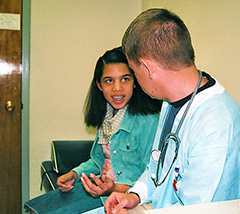What are Mr. Logan’s roles and responsibilities, and what types of services should he provide in a school setting?
Page 2: Healthcare Services
 As we mentioned earlier, one of the many roles of the school nurse is to provide direct healthcare services. Mr. Logan may provide a number of healthcare services, which include but are not limited to:
As we mentioned earlier, one of the many roles of the school nurse is to provide direct healthcare services. Mr. Logan may provide a number of healthcare services, which include but are not limited to:
- Administering medication (e.g., prescription medication for attention deficit hyperactivity disorder [ADHD])
- Managing chronic conditions (e.g., asthma)
- Caring for and monitoring students with intravenous medication, feeding tubes, tracheostomies, and ventilators
- Helping students, such as those in wheelchairs, to use urinary catheters
- Providing or coordinating one-to-one care for a single student throughout the school day
The services that the school nurse provides are largely dependent on the individual student’s healthcare needs, regardless of the origin of his or her condition. Although students may have different medical conditions, the school nurse may provide similar healthcare services to those students. In the examples below, read about two students who receive services from the school nurse.
 Lilly was in a car accident and broke her leg, which resulted in her having to wear a brace. She gets sores from the brace and is treated by the school nurse. Lilly is expected to fully recover within the next few months.
Lilly was in a car accident and broke her leg, which resulted in her having to wear a brace. She gets sores from the brace and is treated by the school nurse. Lilly is expected to fully recover within the next few months.
 John was born with an orthopedic impairment. He uses a walker and wears leg braces. The braces often irritate his skin. The school nurse monitors his skin routinely and treats any sores that may arise. John will require ongoing healthcare services throughout the year.
John was born with an orthopedic impairment. He uses a walker and wears leg braces. The braces often irritate his skin. The school nurse monitors his skin routinely and treats any sores that may arise. John will require ongoing healthcare services throughout the year.
![]()
 Throughout the past several decades, the need for specialized healthcare services in the school environment has risen. Some reasons for this increase include:
Throughout the past several decades, the need for specialized healthcare services in the school environment has risen. Some reasons for this increase include:
Due to legislative changes, many students with severe disabilities who previously were educated in separate settings are now included in educational settings with peers without disabilities. For example, the passage of P.L. 94.142—The Education for All Handicapped Children Act of 1975—marked the first time children with disabilities were guaranteed rights to free appropriate educations. Because some of these students have severe developmental delays and health-related issues, they require more healthcare assistance. Recent legislation has clarified that related services include school nurse services.
Medical advances in technology, treatment, and routine care have enabled more students who are medically fragile to participate in school with their peers who do not have disabilities. For example, students with diabetes have access to technological developments such as insulin pumps and continuous glucose monitors, which allows them to better participate in school with their peers.
As a result of changing attitudes in American society, an increasing number of parents now expect schools to assume responsibility for their children’s overall health. For instance, school nurses often are asked to perform routine healthcare screenings and to provide advice or referrals. In addition, the children of immigrant families who have limited English-language skills frequently use the school nurse as an entry point into the healthcare system.
As a result of the increased need for specialized healthcare services, the technical expertise provided by school nurses is vital to schools. Consequently, school nurses should work with educators to meet the learning and health needs of all students with and without disabilities.